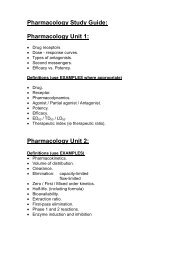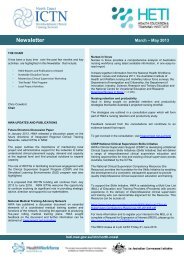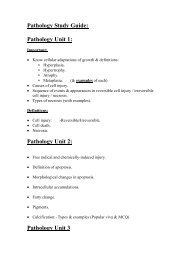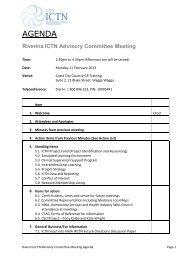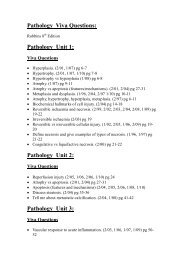Network principles for prevocational medical training - HETI
Network principles for prevocational medical training - HETI
Network principles for prevocational medical training - HETI
Create successful ePaper yourself
Turn your PDF publications into a flip-book with our unique Google optimized e-Paper software.
Education and <strong>training</strong><br />
• z Prepares and reviews a term description in consultation with other attending <strong>medical</strong> officers<br />
in the team, the Director of Prevocational Education and Training, Junior Medical Officer<br />
Management and <strong>prevocational</strong> trainees. The term description describes the responsibilities<br />
and accountabilities of the <strong>prevocational</strong> trainee, specifies the skills required by the<br />
<strong>prevocational</strong> trainee to function safely and defines the specific knowledge and skills to be<br />
gained or enhanced during the term.<br />
• z Discusses <strong>training</strong> goals and expectations with the trainee at the beginning of term and ensures<br />
that a clinical orientation to the term is provided.<br />
• z Develops the educational program available to trainees during the term, supports attendance by<br />
<strong>prevocational</strong> trainees at educational events and provides effective practice-based teaching.<br />
• z Monitors the progress of <strong>prevocational</strong> trainees and provides continuous constructive feedback<br />
to guide their professional development.<br />
• z Encourages attending <strong>medical</strong> officers to provide continuous teaching, supervision and<br />
constructive feedback to <strong>prevocational</strong> trainees.<br />
• z Provides <strong>for</strong>mal documented assessment at mid-term and the end of term. These two <strong>for</strong>mal<br />
assessments begin with the trainee’s self-assessment and are developed in consultation with<br />
attending <strong>medical</strong> officers, registrars, nurses and other professional staff. Assessment includes<br />
planning and documenting actions to improve trainee per<strong>for</strong>mance.<br />
• z Intervenes when necessary to correct gaps or weaknesses in the knowledge or skills of<br />
<strong>prevocational</strong> trainees.<br />
• z In<strong>for</strong>ms the Director of Prevocational Training if a <strong>prevocational</strong> trainee appears to be<br />
experiencing difficulty with work or the <strong>training</strong> program.<br />
Skills, knowledge, experience competencies and behaviours<br />
The Term Supervisor must be an attending <strong>medical</strong> officer (AMO) at the hospital with AMO<br />
responsibility <strong>for</strong> providing patient care within the scope of the term.<br />
Term Supervisors must have:<br />
• z an understanding of the concepts of adult education, per<strong>for</strong>mance monitoring and quality<br />
improvement<br />
• z superior interpersonal skills<br />
• z a commitment to the mission of the Health Education and Training Institute (<strong>HETI</strong>) and the<br />
ability to present and explain <strong>HETI</strong> goals.<br />
Per<strong>for</strong>mance evaluation<br />
The per<strong>for</strong>mance of the Term Supervisor will be evaluated annually by the General Clinical Training<br />
Committee (GCTC) with reference to:<br />
• z DPET feedback<br />
• z Prevocational trainee feedback<br />
• z Efficiency of activities<br />
• z Per<strong>for</strong>mance indicators (to be developed by the GCTC)<br />
54






